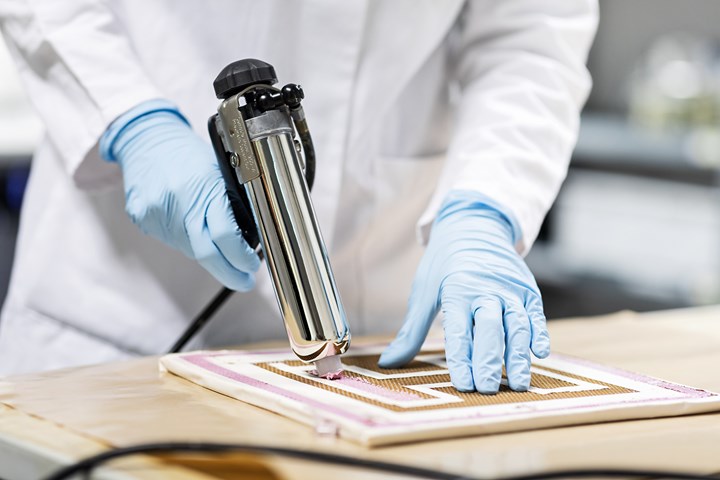Henkel develops REACH-compliant structural adhesive for aircraft interiors
FST-certified Loctite EA 9365FST reinforces and bonds thermoplastic and thermoset substrates and can serve as a matrix resin on fiberglass to strengthen the thin walls of thermoplastic assemblies

Photo Credit: Henkel
Henkel Adhesive Technologies (Düsseldorf, Germany), a leader in structural adhesives and surface treatments for the aircraft OEM and maintenance, repair and operations (MRO) industries worldwide recently developed Loctite EA 9365FST, a new two-part epoxy adhesive that reinforces and bonds thermoplastic and thermoset substrates and can serve as a matrix resin on fiberglass to strengthen the thin walls of thermoplastic assemblies. Developed for use in aircraft interiors, the halogen and antimony-free adhesive is said to meet industry fire retardancy, smoke density and toxicity (FST) requirements, is REACH- and EH&S-compliant worldwide and is qualified to Boeing (Chicago, Ill., U.S.) process specification BAC 5568.
According to Henkel, Loctite EA 9365FST cures in only two hours at 70°C (158°F) or in seven days at room temperature. The adhesive offers good mechanical performance when bonding properly treated thermoplastics and thermosets to a range of other substrates. This user-friendly epoxy also reportedly provides an excellent balance of adhesion performance and FST compliance. Designed not to yellow over time, the product is paintable, delivering good color performance with less show-through than older adhesive formulations.
When used as a matrix resin, Henkel says Loctite EA 9365FST easily wets out fiberglass, strengthening thin thermoplastic assembly walls for enhanced structural support in interior applications including wall, ceiling and floor panels; compartments and cabin stowage; galleys; lavatories; and seating. The product is available globally and has targeted applications in commercial aviation, defense and rail applications.
Related Content
-
PEEK vs. PEKK vs. PAEK and continuous compression molding
Suppliers of thermoplastics and carbon fiber chime in regarding PEEK vs. PEKK, and now PAEK, as well as in-situ consolidation — the supply chain for thermoplastic tape composites continues to evolve.
-
Natural fiber composites: Growing to fit sustainability needs
Led by global and industry-wide sustainability goals, commercial interest in flax and hemp fiber-reinforced composites grows into higher-performance, higher-volume applications.
-
Sulapac introduces Sulapac Flow 1.7 to replace PLA, ABS and PP in FDM, FGF
Available as filament and granules for extrusion, new wood composite matches properties yet is compostable, eliminates microplastics and reduces carbon footprint.













